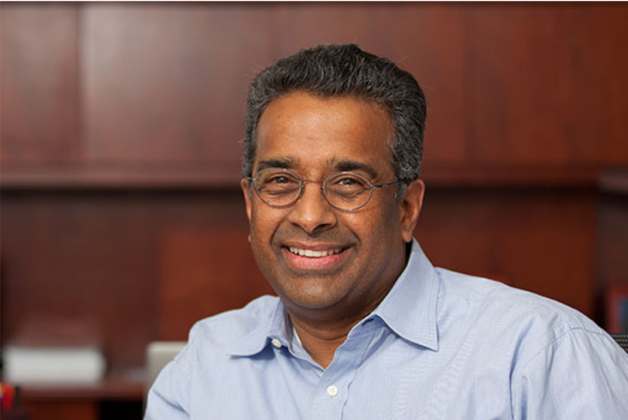Ramamoorthy Ramesh, senior faculty scientist in the Materials Sciences Division of the U.S. Department of Energy’s Lawrence Berkeley National Laboratory (Berkeley Lab) and professor of physics and materials science & engineering at UC Berkeley, has been elected as a foreign member of the Royal Society for his “discoveries in complex oxides, from novel fundamental physics, through new materials, to their application in ferroelectric, magnetic and multiferroic devices.”
Ramesh’s research is known worldwide for his seminal contributions to the field of complex functional oxides. He has published over 600 papers and reviews, and his work has been cited over 70,000 times.
He pioneered major areas of research, including the materials physics of ferroelectrics. His work on correlated phenomena in oxides led to the discovery of colossal magnetoresistance in manganites. And in the area of multiferroics, he demonstrated the use of electric fields to control magnetism and more recently emergent phenomena in oxide superlattices.
He was elected a fellow of the American Association for the Advancement of Science in 2005, and in 2011, he was elected to the National Academy of Engineering, among many other awards.
From 2010 to 2012, he served as the founding director of the SunShot Initiative at the Department of Energy, overseeing and coordinating the R&D activities of the U.S. Solar Program.
Today, he is among the Royal Society’s 51 new fellows, 10 new foreign members, and 1 new honorary member.
The Royal Society, which dates back to 1660, is the oldest scientific academy in continuous existence. The self-governing fellowship is made up of the most eminent scientists, engineers, and technologists from the UK and the Commonwealth. Fellows and foreign members are elected for life through a peer review process on the basis of excellence in science.
The Society’s fellowship of approximately 1,600 fellows and foreign members include around 80 Nobel laureates. Each year up to 52 fellows and up to 10 foreign members are elected from a group of around 700 candidates who are proposed by the existing fellowship.
For more information, see:
“Outstanding Scientists Elected as Fellows and Foreign Members of the Royal Society,” Royal Society news release
###
Founded in 1931 on the belief that the biggest scientific challenges are best addressed by teams, Lawrence Berkeley National Laboratory and its scientists have been recognized with 13 Nobel Prizes. Today, Berkeley Lab researchers develop sustainable energy and environmental solutions, create useful new materials, advance the frontiers of computing, and probe the mysteries of life, matter, and the universe. Scientists from around the world rely on the Lab’s facilities for their own discovery science. Berkeley Lab is a multiprogram national laboratory, managed by the University of California for the U.S. Department of Energy’s Office of Science.
DOE’s Office of Science is the single largest supporter of basic research in the physical sciences in the United States, and is working to address some of the most pressing challenges of our time. For more information, please visit energy.gov/science.

